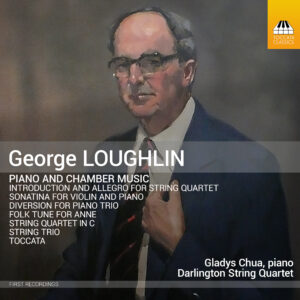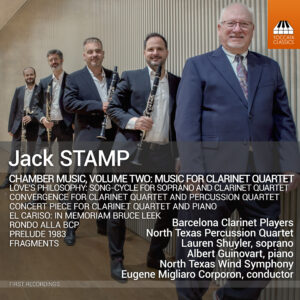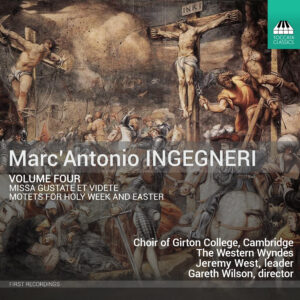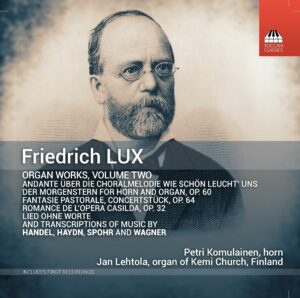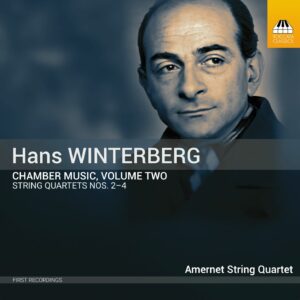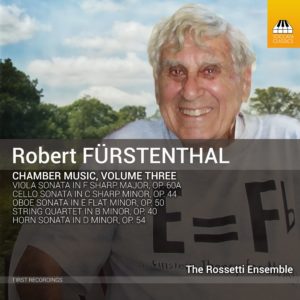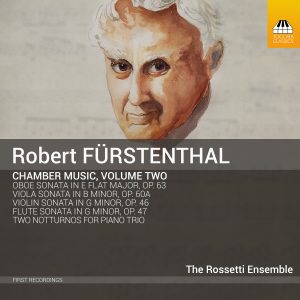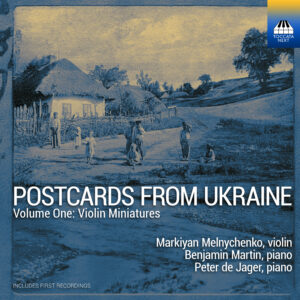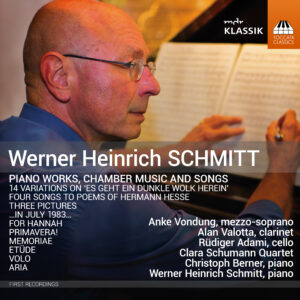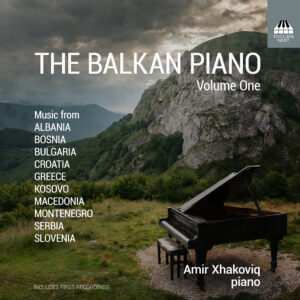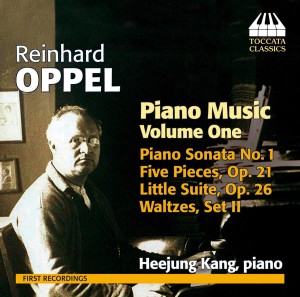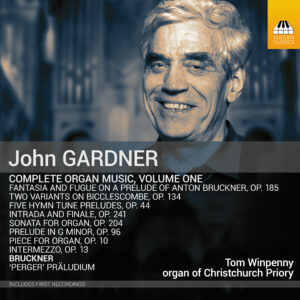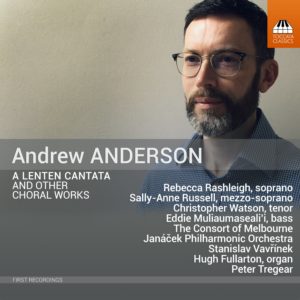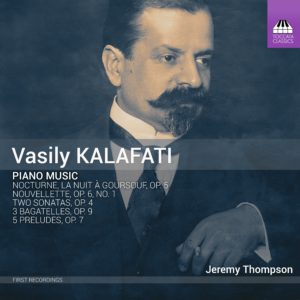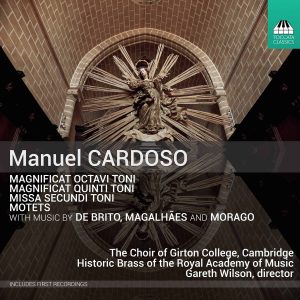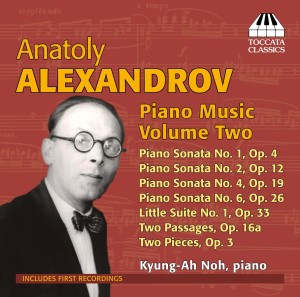Search Results for "The Black Alley Newty Ping" – Page 12
Showing results for black alley net ping
George Loughlin: Chamber and Instrumental Music
The Liverpudlian George Loughlin (1914–84) was appointed professor of music at the University of Melbourne in 1958, remaining in that post for 21 years. That he was also a composer was generally unknown – a former colleague, hearing one of the pieces on this album, exclaimed: ‘That’s George?’ The earliest works here are audibly by an English composer, one who knew his Vaughan Williams, and blend an honest sincerity with fleet-footed wit. The approach of the later pieces is more philosophical and searching, the harmony more at ease with dissonance and the melodic lines more angular – in both peppy counterpoint and long-breathed lyricism.
Gladys Chua, piano
Darlington String Quartet
Jack Stamp: Chamber Music, Volume Two
Celebrating his 70th birthday on March 5th, the American composer John Stamp (b. 1954) – universally known as ‘Jack’ – is a familiar figure in the worlds of the symphonic wind-band movement that flourishes in US universities and of the brass band on both sides of the Atlantic. When the Barcelona Clarinet Players asked him for a new work, and then proposed this album, he had to create the repertoire from scratch. The range of moods he has generated here is surprisingly wide, from gentle night-music that caresses the ear, via jaunty fugal textures and buoyant counterpoint, to catchy dance-rhythms that set the foot tapping.
Barcelona Clarinet Players
North Texas Percussion Quartet
Lauren Shuyler, soprano
Albert Guinovart, piano
North Texas Wind Symphony
Eugene Migliaro Corporon, conductor
Marc’Antonio Ingegneri: Volume Four – Missa Gustate et videte; Motets for Holy Week and Easter
The Cremonese composer Marc’Antonio Ingegneri (c. 1535/36–92) is chiefly remembered as the teacher of Claudio Monteverdi while, for well-nigh 500 years, his own achievements were left to sit in the shadows. This fourth in a series of pioneering recordings from the Choir of Girton College, Cambridge, presents a sequence of music for Holy Week and Easter, confirming Ingegneri to have been one of the masters of his age. The striking range of moods heard here will confound conventional expectations of Renaissance polyphony: Ingegneri’s emotional palette extends from tender intimacy in some of these motets to dancing, celebratory jubilation in the Mass setting – all of it music of breathtaking richness and beauty.
Choir of Girton College, Cambridge
The Western Wyndes
Jeremy West, leader
Gareth Wilson, director
Friedrich Lux: Organ Works, Volume Two
Friedrich Lux (1820–95) was one of those musicians who formed the fabric of musical life in nineteenth-century Germany: though he worked away from the major cities, as conductor, teacher, organist, organiser and composer, he was an indispensable element of the communities in which he worked. His large body of organ music, as good as unknown before now, brings together elements of the musical language of Bach, Mendelssohn and Schumann, in works that range from the intimate to the grandiose.This second volume brings some of his many transcriptions to the fore.
Petri Komulainen, horn
Jan Lehtola, organ of Kemi Church, Finland
Hans Winterberg: Chamber Music, Volume Two
The life of the Prague-born composer Hans Winterberg (1901–91) reads like the outline of a detective novel. Having survived internment in the Terezín (Theresienstadt) ghetto as a Czech Jew, after the War he settled in Munich as a German citizen, and his music enjoyed a number of broadcasts – but after his death his estate disappeared into the vaults of a research institute and was placed under embargo, emerging only in 2015, since when recordings and performances have revealed him as one of the major Czech voices of the twentieth century. This first recording of three of his four string quartets – their language downstream from Janáček and Schoenberg, with folk-music roots refracted through mid-century Czech modernism – confirms Winterberg’s standing and underlines his importance as a lone survivor of the group of young Czech composers whose infinite promise was extinguished in the Holocaust.
Amernet String Quartet
Robert Fürstenthal: Chamber Music, Volume Three
When Germany invaded Austria in 1938, Robert Fürstenthal, born in 1920, took the path of many Viennese Jews and fled to the United States, where he made his living as an accountant; the fact that he had written music in his youth was soon forgotten. Reconnection, after 35 years, with the woman who had been his first love rekindled both that flame and his urge to compose, and from then on songs and chamber music flowed from his pen, preserving the spirit of fin-de-siècle Vienna under the Californian sun – ‘When I compose, I am back in Vienna’, he explained. He died in November 2016, aged 96, knowing that his lyrical, eloquent music was at last attracting the attention of both musicians and microphones.
The Rossetti Ensemble
Nicholas Korth, horn (1–4)
Timothy Lowe, cello (5–8)
Malcolm Messiter, oboe (9–12)
Martyn Jackson, violin (15–18)
Sara Trickey, violin (15–18)
Sarah-Jane Bradley, viola (13–18)
John Lenehan, piano (1–14)
Robert FÜRSTENTHAL: Chamber Music, Volume Two
When Germany invaded Austria in 1938, Robert Fürstenthal, born in 1920, took the path of many Viennese Jews and fled to the United States, where he made his living as an accountant; the fact that he had written music in his youth was soon forgotten. Reconnection, after 35 years, with the woman who had been his first love rekindled both that flame and his urge to compose, and from then on songs and chamber music flowed from his pen, preserving the spirit of fin de siècle Vienna under the Californian sun – ‘When I compose, I am back in Vienna’, he explained. He died in November 2016, aged 96, knowing that his lyrical, eloquent music was at last attracting the attention of both musicians and microphones.
The Rossetti Ensemble
Kathryn Thomas, flute
Sarah-Jane Bradley, viola
Malcolm Messiter, oboe
Timothy Lowe, cello
John Lenehan, piano
Sara Trickey, violin
FIRST RECORDINGS
Postcards from Ukraine, Vol. 1: Violin Miniatures
Ukrainian classical music is not even two centuries old, and for most of that time has had to contend with active attempts at suppression by a bullying neighbour. But Ukrainian composers have stood their ground, not least by taking inspiration from the folk-music that has long thrived in Ukraine’s mountains and fields. In this first of a series of Postcards from Ukraine the Ukrainian-Australian violinist Markiyan Melnychenko presents a programme of largely unknown miniatures for violin and piano, all based on, or inspired by, that folk-culture. Alternately sparkling and soulful, these violin showpieces make the case for a more thorough examination of the riches still to be discovered in Ukraine’s musical heritage.
Markiyan Melnychenko, violin
Benjamin Martin, piano
Peter de Lager, piano
Werner Heinrich Schmitt: Piano Works, Chamber Music and Songs
Werner Heinrich Schmitt, born in Mannheim in 1961, began to study the piano in boyhood, and soon started to compose as well. Since then he has earned his living as a pianist, writing music as time permitted. This first album of his works reveals a composer of considerable substance, particularly in the two moving song-cycles that book-end this album. The sensitivity and resourcefulness of Schmitt’s aural imagination are confirmed in the chamber and piano pieces heard here. Some are infused with joy, others with sorrow, but they all speak a musical language that aims to speak to the listener directly.
Anke Vondung, mezzo-soprano
Alan Valotta, clarinet
Rüdiger Adami, cello
Clara Schumann Quartet
Christoph Berner, piano
Werner Heinrich Schmitt, piano
The Balkan Piano, Volume One
The composing traditions of the ten Balkan countries are as good as unknown in the rest of the world. In this revelatory piano recital, the Albanian pianist Amir Xhakoviq presents a glittering array of keyboard jewels from his own country and its neighbours, ranging from wild and energetic toccatas to timeless evocations of bells and other ancient traditions, with a surprisingly wide range of references, from folk-music to Scarlatti and jazz. As ‘Volume One’ indicates, this album is intended as the first of a series that will continue to explore the unfamiliar music of the Balkans.
Amir Xhakoviq, piano
Reinhard Oppel: Piano Music, Volume One
Reinhard Oppel (1878–1941) was a major figure in inter-War Germany, as composer, teacher and theoretician. His rich, late-Romantic music encompasses symphonies, chamber and choral music, songs and works for piano. His music went underground in East Germany – literally: after World War II, when his family fled west from the occupying Russian army, they hid his music under the garden shed and there it remained, unknown, until the fall of Communism, when his son was able to return and retrieve it. This first CD of his heart-warming, Dvořákian piano music begins a series of releases intended to win Oppel’s music the audience it deserves.
Heejung Kang, piano
John Gardner: Complete Organ Music, Volume One
The music of the English composer John Gardner (1917–2011) – basically tonal and always impeccably crafted – is characterised by rhythmic vivacity and harmonic immediacy. His musical fingerprints come from his love of jazz, Renaissance and Baroque procedures and his mastery of imitative counterpoint; his use of established musical forms invests them with a quirky and distinctive harmonic idiom. This first album of two collecting his entire output of organ music presents not only his sly humour but also the staggering contrapuntal craftsmanship of his fugue on a theme by Anton Bruckner – one of the monuments of recent British writing for the organ.
Tom Winpenny, organ of the Christchurch Priory
Andrew Anderson: A Lenten Cantata and Other Choral Works
In spite of the differences of time and distance, the choral works of the Australian composer Andrew Anderson (born in Melbourne in 1971) further the English cathedral tradition of such composers as Finzi and Howells, in music concerned particularly with lyricism and with clarity and directness of expression.
Rebecca Rashleigh, soprano (Track 5)
Sally-Anne Russell, mezzo-soprano (Tracks 3, 17)
Christopher Watson, tenor (Track 3)
Eddie Muliaumaseali’i, bass (Track 7)
The Consort of Melbourne (Tracks 2, 4, 6, 8, 9–16)
Janáček Philharmonic Orchestra (Tracks 1-3, 5-8, 17)
Pavel Doležal, violin (Track 4)
Stanislav Vavřínek, conductor (Tracks 1–3, 5–8, 17)
Hugh Fullarton, organ (Tracks 9, 15, 16)
Peter Tregear, choirmaster (Tracks 2, 4, 6, 8), conductor (Tracks 9–16)
Vasily Kalafati: Piano Music
The name of Vasily Pavlovich Kalafati (1869–1942), born to Greek parents in the Crimea, has a toe-hold in the history books as one of Stravinsky’s teachers, but he was an accomplished composer in his own right. The early piano works recorded here show the influence of Rimsky Korsakov (his teacher and friend) and other Russian-nationalist composers, but they also owe something to the examples of Chopin and Brahms, not least in their blend of passion and textural clarity. The vigour of these pieces stands in stark contrast to the ultimate fate of their composer: he starved to death during the Siege of Leningrad.
Jeremy Thompson, piano
Manuel Cardoso: Missa Secundi Toni and Other Works
Manuel Cardoso (1566–1650) was one of the most important composers of the golden age of Portuguese polyphony around the turn of the seventeenth century. But modern choirs have been surprisingly slow to explore the rich legacy of his compositions: this is the first recording of his Missa Secundi Toni, and the first of any of his works with brass consort, its dark colours providing an effective contrast with the young voices of the Girton College Choir.
The Choir of Girton College, Cambridge (Tracks 1–2, 4–7)
Historic Brass of the Royal Academy of Music (Jeremy West, leader) (Tracks 1–5, 7 10–14, 16–17)
Lucy Morrell, organ (Tracks 1–5, 7–8, 10–13, 15–17)
Gareth Wilson, director (Tracks 1–7, 9–14, 16–17)
Anatoly Alexandrov: Piano Music, Volume Two
Anatoly Alexandrov (1888-1982) is one of the forgotten figures of the Russian school of pianism that embraced Taneyev, Rachmaninov, Skryabin, Shostakovich, Gilels and so many other composers and pianists. Alexandrov composed fourteen sonatas and much else for piano in an attractive late-Romantic style that owes much to Nikolai Medtner, his teacher and friend. The reviewer for MusicWeb International called Vol. 1 of this series a 'superb debut-disc' and commented that Kyung-ah Noh 'plays with immense power when called for, but is equally able to command the subtlest “pianissimo”.
Kyung-Ah Noh, piano
Stay In the Know
JOIN THE TOCCATA NEWSLETTER
"*" indicates required fields
By visiting our site, you agree to our privacy policy regarding cookies, tracking statistics, etc.
